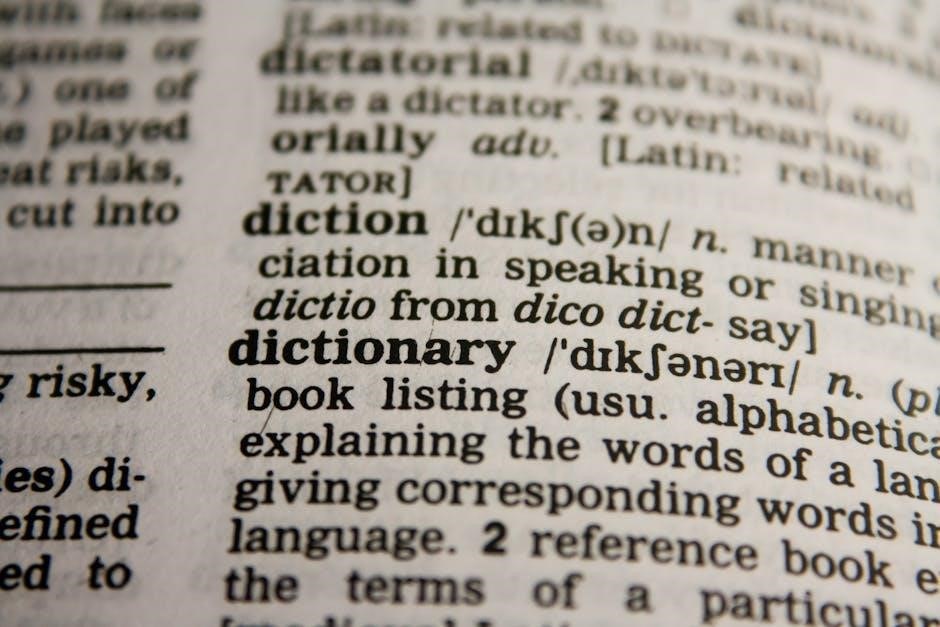
The AP English Language and Composition course is a college-level program focusing on nonfiction texts, rhetorical strategies, and evidence-based argumentation. It prepares students for the AP exam by enhancing analytical and writing skills, emphasizing critical thinking and clear expression of ideas.
1.1 Overview of the Course
The AP English Language and Composition course is a college-level program designed for 11th and 12th graders, focusing on nonfiction texts, rhetorical strategies, and evidence-based argumentation. It emphasizes critical reading, effective writing, and analytical skills to prepare students for the AP exam.
Students engage with diverse texts to understand rhetorical devices, tone, and syntax. The course evaluates their ability to craft persuasive arguments and analyze complex sources, ensuring readiness for the exam’s multiple-choice and free-response sections.
1.2 Importance of the Textbook in Preparation
A comprehensive AP English Language and Composition textbook is essential for mastering rhetorical strategies, essay writing, and test-taking techniques. It provides practice tests, sample essays, and detailed explanations, aligning with the course curriculum and exam format. The textbook serves as a key resource for understanding complex texts and refining argumentation skills.

Key Features of the AP English Language and Composition Textbook
The textbook includes detailed rhetorical analysis guides, practice essays, and sample prompts. It offers comprehensive coverage of exam topics, test-taking strategies, and essay-writing techniques, ensuring thorough preparation for the AP exam.
2.1 Structure and Organization
The textbook is divided into clear chapters, each focusing on specific skills like rhetorical analysis, argumentation, and synthesis. Practice tests mirror the actual exam format, while detailed explanations and study tips are interspersed throughout, making it easy for students to navigate and master the material systematically. This structure ensures comprehensive and organized learning.
2.2 Comprehensive Coverage of Rhetorical Strategies
The textbook thoroughly explores rhetorical strategies such as ethos, pathos, and logos, providing detailed explanations and examples. It includes exercises to help students identify and analyze these devices in texts, ensuring mastery of rhetorical analysis for the AP exam. This focus enables learners to critically understand and apply these strategies in their writing.
2.3 Practice Tests and Essay Prompts
The textbook includes full-length practice tests and essay prompts that mirror the AP exam format. These resources help students familiarize themselves with the test structure, refine their essay writing, and improve time management. Detailed explanations and scoring guidelines are provided to enhance understanding and performance in both multiple-choice and free-response sections.

Popular Textbooks for AP English Language and Composition
Textbooks like Princeton Review, Barron’s, and REA’s Crash Course are widely used for AP English prep, offering comprehensive reviews, practice tests, and essay prompts based on the course outline and actual exam questions.
3.1 Princeton Review AP English Language and Composition Prep
The Princeton Review’s prep book offers a detailed review of course content, including rhetorical strategies and essay writing techniques. It features practice tests, essay prompts, and strategies to master the exam format, helping students build confidence and improve their performance in both multiple-choice and free-response sections.
3.2 Barron’s AP English Language and Composition
Barron’s textbook provides comprehensive coverage of the AP English Language and Composition course, offering test-taking strategies, essay writing tips, and five full-length practice exams with detailed explanations. It aligns with the latest exam format, helping students master rhetorical analysis, argumentation, and synthesis essays while building confidence for test day.
3.3 REA’s AP English Language and Composition Crash Course
REA’s Crash Course is a concise, targeted review guide for last-minute AP English Language and Composition prep. It includes a detailed outline of the course, practice tests, and online resources. Designed for quick study, it covers rhetorical strategies, essay writing, and test-taking tips, helping students refine their skills efficiently before the exam.

How to Use the Textbook Effectively
Set clear goals, actively engage with practice tests, and focus on weak areas. Track progress, utilize online resources, and review essay prompts to maximize preparation and understanding.
4.1 Creating a Study Schedule
A well-organized study schedule helps balance reading, practice tests, and essay writing. Allocate specific days for rhetorical analysis, vocabulary building, and reviewing strategies; Consistency is key—dedicate time daily to ensure steady progress and mastery of course materials, aligning with the textbook’s structure for optimal preparation.
4.2 Focusing on Weak Areas
Identify your weaknesses by reviewing practice test results and essay feedback. Dedicate extra study time to areas needing improvement, such as rhetorical analysis or argumentation. Use textbook resources like practice prompts and exercises to strengthen skills. Regularly assess progress to ensure steady improvement and confidence in tackling challenging topics effectively.
4.3 Utilizing Online Resources
Supplement textbook learning with online platforms like AP Central and Khan Academy for additional practice and insights. Utilize digital study guides and forums to explore essay prompts and rhetorical strategies. Online resources offer flexible learning opportunities, helping students refine skills and access real-time feedback to enhance their preparation for the AP exam effectively.

Understanding the AP Exam Format
The AP exam includes multiple-choice questions and free-response essays, assessing reading comprehension, rhetorical analysis, and writing skills. The format evaluates a student’s ability to analyze texts and synthesize arguments effectively.
5.1 Multiple-Choice Questions
The multiple-choice section tests reading comprehension, analyzing rhetorical strategies, and identifying diction. Students must interpret complex texts, recognize tone, and understand syntax. This segment evaluates ability to apply knowledge of language use in various contexts, ensuring readiness for the exam’s challenging textual analysis components.
5.2 Free-Response Essays
The free-response section includes three essays: argumentation, rhetorical analysis, and synthesis. Students must develop a clear thesis, use textual evidence effectively, and demonstrate mastery of language. This section evaluates critical thinking, writing skills, and the ability to address prompts thoughtfully, requiring clear, persuasive, and well-organized responses.
5.3 Synthesis Essay Strategies
For the synthesis essay, students must integrate multiple sources to support a coherent argument. Effective strategies include close reading, identifying common themes, and organizing ideas logically. Practicing source integration and refining thesis statements are key to achieving a high score on this challenging section of the exam.

Rhetorical Analysis and Argumentation Skills
Rhetorical analysis involves identifying and interpreting rhetorical devices, claims, and evidence in texts. Students learn to craft persuasive arguments, evaluate sources, and understand the rhetorical situation to enhance their analytical and argumentative writing skills.
6.1 Identifying Rhetorical Devices
Identifying rhetorical devices, such as ethos, pathos, and logos, is crucial for analyzing texts. Students learn to recognize techniques like diction, syntax, and tone, enabling them to understand how authors convey meaning and persuade audiences; Practice exercises in textbooks help refine this skill, essential for excelling in rhetorical analysis on the AP exam.
6.2 Developing Persuasive Arguments
Students master crafting persuasive arguments by integrating claims, evidence, and reasoning. Textbooks provide strategies for organizing essays, using rhetorical appeals, and addressing counterarguments. Practice prompts and sample essays help students refine their ability to articulate clear, compelling arguments, a key skill for success on the AP exam.
6.3 Understanding the Rhetorical Situation
Students learn to analyze the rhetorical situation by identifying the author’s purpose, audience, context, and tone. Textbooks provide exercises and examples to help students recognize how these elements shape the text’s meaning and effectiveness, enhancing their ability to interpret and respond to complex works in the course and on the exam.
The Role of Nonfiction Texts in the Curriculum
Nonfiction texts are central to the curriculum, providing diverse perspectives and complex styles for rhetorical analysis. They help students develop evidence-based arguments and analytical skills essential for the exam.
7.1 Importance of Nonfiction in AP English
Nonfiction texts are vital in AP English as they expose students to diverse perspectives, real-world issues, and rhetorical strategies. They are essential for the synthesis essay and free-response questions, requiring students to analyze and integrate sources effectively, mirroring college-level academic writing and critical thinking.
7.2 Analyzing Complex Texts
Students learn to deconstruct complex nonfiction texts by identifying rhetorical strategies, such as ethos, pathos, and logos. They analyze diction, tone, and structure to understand the author’s intent. This process enhances critical thinking and prepares students to craft evidence-based arguments, mirroring the skills required for the AP exam.
7.3 Integrating Sources into Essays
Students learn to seamlessly incorporate sources into essays, using techniques like citation, paraphrasing, and direct quotation. This skill is crucial for the synthesis essay, where multiple sources must be woven into a cohesive argument. Proper integration enhances the credibility and depth of writing, aligning with the AP exam’s emphasis on evidence-based argumentation.

Tips for Scoring High on the AP Exam
Understand the grading rubric to tailor essays and responses. Utilize practice tests to refine time management and argumentation skills; Incorporate study guides for targeted improvement.
8.1 Mastering Essay Writing Techniques
Mastering essay writing techniques is crucial for excelling on the AP English Language and Composition exam. Textbooks emphasize developing clear theses, organizing arguments logically, and using evidence effectively. Practice essays from study guides help refine skills in rhetorical analysis, synthesis, and persuasive writing, ensuring students can articulate ideas clearly and persuasively under timed conditions.
8.2 Time Management Strategies
Effective time management is essential for the AP English Language and Composition exam. Textbooks provide strategies to allocate minutes for reading, analyzing, and writing. Practice tests help students pace themselves, ensuring they address all questions within the allotted time, reducing stress, and optimizing their performance across multiple-choice and essay sections.
8.3 Understanding the Grading Rubric
The grading rubric for the AP English Language and Composition exam evaluates essays based on thesis, evidence, reasoning, organization, and style. Textbooks provide detailed breakdowns of the rubric, offering insights into how essays are scored. Sample essays with graded responses help students understand expectations, enabling them to align their writing with grading criteria for higher scores.

Supplementary Resources for Exam Preparation
Authorized textbooks, online platforms like Khan Academy, and practice exams from College Board offer comprehensive support. Study guides and workbooks, along with teacher and peer feedback, enhance preparation for the exam effectively.
9.1 Online Practice Platforms
Online platforms like Khan Academy and College Board offer digital tools for AP English Language and Composition prep. These resources include practice tests, timed essay prompts, and interactive exercises to refine rhetorical analysis and argumentation skills. Students can access detailed feedback and track progress to improve performance effectively for the exam.
9.2 Study Guides and Workbooks
AP English Language and Composition study guides and workbooks, such as those from Princeton Review and Barron’s, provide comprehensive practice tests, essay prompts, and detailed explanations. These resources focus on rhetorical strategies, argumentative writing, and synthesis essays, helping students refine their skills and prepare effectively for the exam with targeted exercises and expert insights.
9.3 Teacher and Peer Feedback
Teacher and peer feedback are invaluable for refining writing and analytical skills. Teachers provide expert insights, while peers offer diverse perspectives, helping students identify strengths and areas for improvement. Regular feedback sessions, often supported by study guides, enable students to refine their arguments and essay techniques, aligning their work with exam expectations.

Common Challenges and Solutions
Students often struggle with rhetorical analysis, timed essays, and test anxiety. Using study guides, practicing with sample prompts, and applying relaxation techniques can effectively address these challenges.
10.1 Difficulty with Rhetorical Analysis
Students often struggle to identify and explain rhetorical devices, such as ethos, pathos, and logos, in complex texts. To overcome this, practicing with sample prompts and utilizing textbook exercises that focus on analyzing nonfiction sources can enhance understanding and improve analytical skills effectively.
10.2 Struggles with Timed Writing
Many students find timed essays challenging due to time pressure and the need to organize ideas quickly. Practicing under timed conditions and using textbook exercises can help improve speed and clarity. Focusing on creating strong outlines before writing and managing time effectively during practice sessions are key strategies to overcome this difficulty.
10.3 Overcoming Test Anxiety
Test anxiety can hinder performance, but strategies like deep breathing, positive visualization, and thorough preparation can help. Using textbook resources for practice tests and understanding the grading rubric build confidence. Regular timed exercises and focusing on one question at a time also reduce stress, ensuring students approach the exam with clarity and calmness.

The Evolution of AP English Language and Composition
The course has evolved to include diverse texts and digital tools, reflecting modern educational needs and enhancing student engagement with rhetorical analysis and argumentative writing skills.
11.1 Changes in Course Curriculum
Recent updates to the AP English Language and Composition curriculum include expanded emphasis on nonfiction texts, digital sources, and interdisciplinary connections. The course now integrates more diverse voices and contemporary issues, fostering critical thinking and adaptability in students’ analytical and compositional skills, aligning with evolving educational standards and societal demands.
11.2 Updates in Textbook Content
Textbooks now include updated practice tests, revised essay prompts, and expanded coverage of rhetorical strategies. Digital integration has been enhanced, with online resources and multimedia elements to support learning. New editions reflect diverse perspectives and contemporary issues, ensuring relevance and alignment with current AP English Language and Composition exam requirements and expectations.
11.3 Impact of Digital Learning Tools
Digital learning tools have transformed AP English Language and Composition preparation by offering online practice platforms, interactive exercises, and real-time progress tracking. These tools enhance engagement and flexibility, allowing students to access resources 24/7. They also align with updated course curricula, ensuring students are well-prepared for the evolving demands of the exam and modern education.
The AP English Language and Composition course requires persistence, dedicated practice, and the right resources to master rhetorical analysis and essay writing, ensuring exam success.
12.1 Final Tips for Success
Mastering the AP English Language and Composition exam requires consistent practice, thorough review of rhetorical strategies, and effective time management. Utilize textbooks like Princeton Review and Barron’s for targeted preparation. Focus on analyzing nonfiction texts, refining essay techniques, and understanding the grading rubric to achieve a high score. Regular practice with past exams is essential.
12.2 The Value of Persistence and Practice
Persistence and practice are key to excelling in AP English Language and Composition. Regularly reviewing rhetorical strategies, analyzing nonfiction texts, and refining essay writing skills ensure steady improvement. Utilize textbooks like Princeton Review and Barron’s for targeted practice tests and essay prompts, helping you master the exam format and build confidence in your abilities.